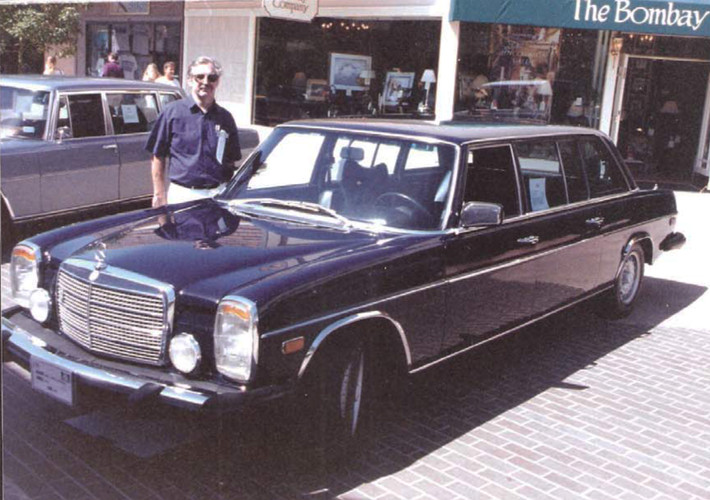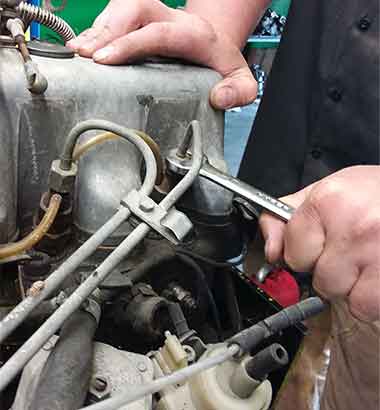The Story of Frank: a Rare Long-Wheelbase W115
Posted by Sheila on Nov 22nd 2021
The story of Frank: a Rare Long-Wheelbase W115
by Bob Gunthorp
edited by Sheila Heaney
This W115 LWB 220D was restored and converted to a W114 280E using no less than nine donor vehicles, earning the name “Frankenstein”, or “Frank” for short. Here’s the verbal and pictorial history of this unique project.
This
extended wheel base 220D (W115.112) was originally sold in Hong Kong. It was
first registered in Hong Kong on September 13, 1973. It was delivered with
right hand drive, power steering, and air conditioning.

The O’Donnell Tour & Travel Service imported the vehicle into the US on June 12, 1984. Since the vehicle was RHD they were unable to get to it pass the US DOT requirements to register in the United States. So, they donated it to the Riverside Community College in March of 1988. On March 25, 1989 a man acquired the vehicle from the Riverside Community Collage. This man’s father had at one time owned a wrecking yard across the street from Onager Corporation. The father suggested that his son call us about purchasing the vehicle. He then called me and told me about the vehicle I said, “Sure bring it down and I’ll buy it.” To this day, I maintain a reputation for buying any unusual vehicle.
At
that time there were 9 vehicles in the collection and my wife Terry put her foot
down and said, “Nine is enough you cannot have any more.” However, as soon as
she saw the 220D she said that she wanted it as one of “her” cars. I said
that’s fine with me, I will restore it for you. The next thing that she asked
was which of the vehicles I was going to sell so that there would still be only
nine in the collection. I listed off several of the ones that I would consider
selling. Terry then asked about the rest of the vehicles. My reply was: “The
ones that I listed are your cars. Why do I have to sell one of my cars so that
you can have another one of your own?”She looked at me for a moment and replied, “A miracle, we now have 10
cars” and the restoration began.

In addition to the challenge of converting the vehicle
to LHD in order to register it, the floor was rusted to the point that it had
become unsafe to drive and most of the mechanical components were shot. Thus,
the first step was to park it and wait for the parts we’d need for the
restoration. Two months later, we were able to buy a wrecked 1974 280C to use as
a donor for the LHD-specific parts. The coupe was severely damaged in the rear
and also had some damage to the right front fender. It was mechanically in
excellent condition. The 280C came equipped with an automatic transmission, US-impact
bumpers, electric windows, and central locking. These were options the 220D did
not have. This solved the problems for the front section of the 220D, including
changing it to LHD from RHD. However, the rear floor and all the doors were so
severely rusted that they had to be replaced also.

We spent two more years gathering together the rest of
the parts needed to complete the project. The first step was to strip both
vehicles of all the interior parts. Because the front window posts (A pillars)
on the Coupe model are different than those used on a sedan, I had to remove
the dash from the coupe as well. I also removed all the exterior moldings and
the bumpers. A number of other parts
were used from a number of parts vehicles.
Two and a half years into the project, on October 7,
1991 I drove both vehicles to the body shop. In spite of all the parts that I
had removed, I had still left both of the vehicles in drivable condition. The
body shop replaced the front and rear body sections and the front doors. They
had to totally rebuild both rear doors, as the only parts of them that were the
door frames. They also had to fabricate the extended section of the rear side
panels. To do this they used a pair of rear door skins so that the contours
matched. When all the major body re-assembly was completed, the vehicle was
towed to my shop. There we did all the mechanical re-assembly and the
mechanical modifications that were needed. These modifications included
extending the fuel lines, the brake lines, and the exhaust system. A new drive
shaft center section had to be made. All
this work took several weeks to complete.




I then drove it back to the body shop for painting.

After it was painted I finished the re-assembly. This included the bumpers, all
the exterior trim, and the lighting systems. The entire interior had to be re‑installed
including the dash. This work took another six weeks. Once we started work on
the project, the time from start to finish was about six months. This is record
time for the amount on work required on this type of resurrection. Two months
after completing the restoration and several short “shake down” runs, we drove
the vehicle on a 3,500-mile trip with no problems. In 1995, we completed the
project by installing a fuel-inject M110 gasoline engine and transmission from
a W114 280E.








